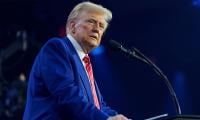threats, a tradition of fumbling democracy, and a strong military establishment – it is not surprising that Pakistan has found itself more entangled than most.
From a purely practical point of view, even the most well endowed states can manage only a few entanglements at a time. Less endowed states can manage less. The first major goal of Pakistan’s foreign policy should be to reduce the number of ‘theatres’ of complicated entanglements we are wilfully or unwilfully involved in.
Consider, for example, the fact that to varying extents all four of our neighbours – India, China, Afghanistan, Iran – believe that groups that wish them ill are operating from our soil. At least two of them believe that such groups operate with our tacit support. Without even debating the veracity of such belief, our immediate neighbourhood relations become intrinsically fractious.
The immensely complicated – in fact, confused – entanglements with our most important international partner, the United States, are even more unmanageable. All indications suggest that it will become only more complicated – more confused – with the potential retreat of US forces from Afghanistan.
It is in this context and history that concern is being raised in Pakistan about the new set of entanglements being manufactured with Saudi Arabia. At a time of much flux in the power-politics of the Middle East, Saudi generosity – much like US generosity at other points in our history and, possibly, in our immediate future – is likely to come at a high foreign policy price.
Pakistan faces very real and very immediate internal and external security threats. Being exposed to so many complicated entanglements on so many fronts only exacerbates those threats. The point merely is that Pakistan foreign policy is too entangled in too many places. There is a need to bring back focus, to unclutter, and to establish goal clarity.
Even as a security-centred foreign policy places primary focus on the containment of enemies, it also distracts from that other key purpose of good foreign policy: nurturing friendships. Today, it is difficult to figure out exactly who our friends are. If any. Mostly, because, for at least a decade, we have been out of the friend-making business. Pakistan urgently needs to re-enter this market.
The good news is that Pakistan has a history of doing so and also the ability to do so in its still very competent foreign service. The bad news is that for too many people – even outside of the security establishment – foreign and security policy have so morphed into each other that all non-security concerns are not just ignored, but scorned.
The second major goal of Pakistan’s foreign policy should be re-establish its credentials in the diplomacy of engagement. This would entail at least three dimensions: economic diplomacy, global citizenship, and public diplomacy.
Economic diplomacy is something that the current government has shown high interest in. With China and Turkey and also with the EU textile quota, the government has moved fast and purposefully. In its own eyes, the government probably sees its overtures to Saudi Arabia as economic engagement rather than political entanglement.
However, economic diplomacy in this age of globalisation is more than the diplomacy of MOUs or beefing up foreign exchange reserves. It has to be a diplomacy of trade, of finance and investment, of employment generation, of market development. It has to be a diplomacy that goes beyond scoring ‘deals’ with a few close allies to the deployment of international economic law to the benefit of our own markets, our producers, our consumers, our labour force.
It is a diplomacy that happens not only at the occasional prime ministerial visit to another country, but which is undertaken everyday at the World Trade Organisation (WTO) and at every Pakistani mission around the world. It is a diplomacy that links directly to global citizenship.
Historically, Pakistan has been an important actor on many global issues. Our UN mission is still viewed as one of the most important developing country voices in the United Nations. Yet, one sometimes gets the sense that New York is paying more attention to what Pakistan is doing at the United Nations than Islamabad.
Even if this assessment is harsh, it remains true that Pakistan has not capitalised on the importance it can have on global issues. With the economic elevation of China, India, Mexico and Brazil, Pakistan has the potential to become an even more important voice for middle countries. In a world which tends to view us with ever narrower security lenses, here is our opportunity to establish leadership in global citizenship on issues where we have substantive expertise: trade, development, environment, and more.
Public diplomacy is one area of foreign policy that all countries have begun investing heavily in. For example, India set up its Public Diplomacy Division in 2006. For Pakistan the ‘image’ challenge makes public diplomacy a particularly pressing need.
However, public diplomacy has evolved much since the days of Edward R Murrow. Unfortunately, despite some valiant efforts in fits and starts, our institutional buy-in to meaningful public diplomacy remains shaky. Public diplomacy is not simply the occasional showcasing of the ‘softer side’ of Pakistan. It is constructing a well-articulated narrative and implementing a thought-through strategy of engaging a multitude of international actors (states, and beyond states) in an alternative discourse. Importantly, good public diplomacy requires buy-in at the very highest levels.
Most of all, good public diplomacy brings us back to what William Ewart Gladstone, four-time prime minister of Britain, described as his ‘first principle of foreign policy’: Good government at home. There is no better way to improve your image abroad than to improve your reality at home. Ultimately, it may be that reality at home that is our biggest foreign policy challenge of all.
The writer has taught international relations and public policy at Boston University and the Fletcher School of Law and Diplomacy and was the vice chancellor of LUMS.
Twitter: @adilnajam
Most recently, US presidential elections demonstrated how AI has amplified partisan split
Few years ago, Pakistan ranked as fourth-largest freelancer market globally, with potential to become number one
Arts Council Karachi celebrated its 70th birth anniversary at inaugural session with big cake
There are over 11 million Pakistanis settled abroad, out of which around six million work in Gulf and Middle East
This year alone, US Treasury would have to roll-over $10 to $14 trillion in maturing short-term debt
Tear gas no longer marks just protest sites; it paints entire cities as battlegrounds but then again, PTI did it first







